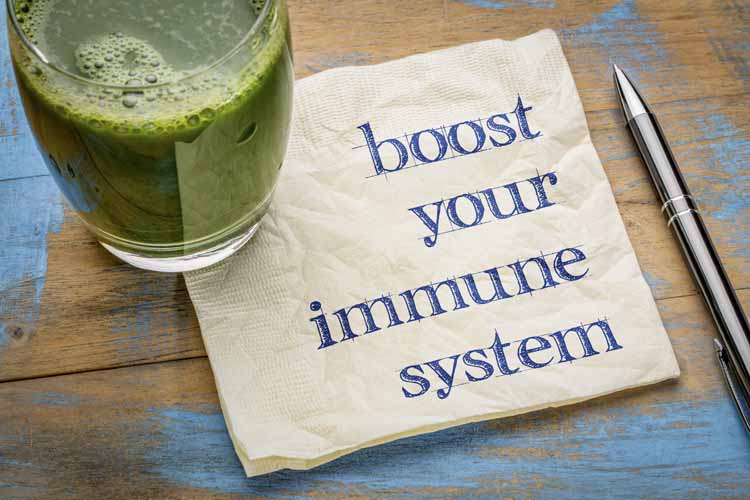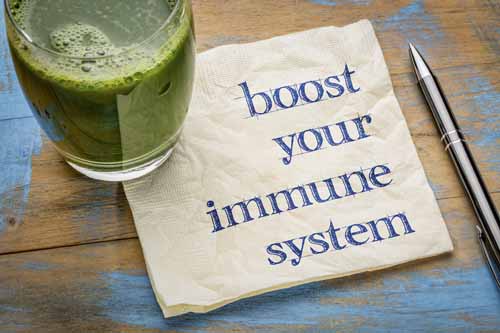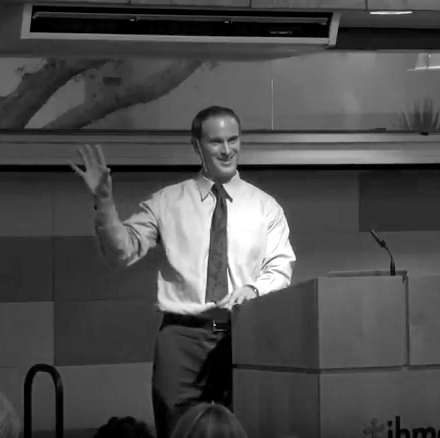Intermittent Fasting Immune System: The Boosting Effects of Fasting
Updated by Stephen Anton PhD on May 15th, 2022

Have you ever felt sick, sluggish, and weak after an indulgent weekend?
If you are like most people, the answer is yes.
Back in 2005, I was doing post-doctoral work in New Orleans, LA, when my parents decided they wanted to come for a weekend visit.
Once they arrived, we spent the next two days enjoying the city and the wonderful restaurants.
It was a great visit.
The problem arose with me on Monday morning; I felt as if I had been hit by a truck and run over.
Now, I know you might be thinking I was drinking all weekend, but that was not the case.
And that is what confused me initially because all I did was consume abundant amounts of rich, delicious foods all weekend with my parents.
That is when the light bulb went on as I thought to myself,
Is it possible that eating too often and not giving the body enough time between meals could have substantial negative effects?
How Eating Frequency Affects Our Immune System
At that point, I dove into all the literature I could find on eating frequency and its effects on the body.
I discovered that eating frequency affects our immune function.
You see, every time we eat, our body has to use energy to metabolize food and convert food into fuel.
This process puts stress on our cells, and if the stress becomes chronic, in this case from eating too often, we can overtax our body’s natural waste removal or cellular cleaning system.
Inside our bodies, we have a system that removes waste and damaged particles from our cells: it is known as the autophagy system.
Autophagy allows the cells to function more efficiently, which improves the functions of our organs, tissues, and the entire immune system.
The number of inflammatory molecules in our blood is directly linked to the function of our autophagy system.
How Autophagy Affects Our Immune System
If you are not familiar with autophagy and the autophagy system, allow me to give you a unique comparison.
Imagine there is trash lying around your house.
You walk through the halls and the rooms and pick up the trash, put the trash in bags, and put the bags in cans by the street.
Then your local garbage collector comes by and takes the garbage; they put it into their truck and haul it off to the landfill or incinerator.
This is what the autophagy system does within our bodies.
The autophagy system has special cells that pick up the waste products and take them to the equivalent of the landfills or incinerators within our bodies.
Finally, we dispose of these waste products through exhalations, secretions, and excretions.
Why is this important?
The Negative Effects of High Eating Frequency on Immune System
It takes our bodies 4-6 hours to digest, metabolize, and utilize the nutrients in food before returning to pre-meal homeostasis.
That means that if you were to eat throughout the day, from when you wake up to when you go to bed, you could end up staying in a post-prandial (that’s a fancy term for post-meal) state for 18 hours or more each day.
Here’s the problem with that.
When you are in the post-prandial state, your body is focused on digesting and assimilating nutrients, not on removing wastes.
So garbage can accumulate in your cells and tissues.
Then over time, it can start to impair the function of your body’s immune system.
Imagine if you were to make your dinner meal using the same pots and pans you used to make your lunch meal, without cleaning them first.
I know, pretty gross, right?
Yet, almost all of us do this to our bodies all the time.
Luckily there’s a simple method you can use to take advantage of autophagy and boost immune function.
That method is intermittent fasting.
Intermittent Fasting and Inflammation
How does intermittent fasting affect inflammation?
Studies have consistently shown that it reduces levels of inflammation, as measured by blood markers in the body.
Given this consistent finding, an important question is how and why fasting works to lower levels of inflammation in the body?
One key mechanism appears to be through activating autophagy, the process our bodies use to remove damaged cells, which are known to secrete inflammatory cytokines and molecules, to a greater degree than healthy cells.
Additionally, the shift into a more ketogenic state that occurs during fasting can greatly reduce the formation of the inflammatory cytokines themselves.
This means that the production of inflammatory markers or signaling molecules is decreased while the removal of damaged cells is increased.
You can think of the removal of damaged cells as being similar to removing an unruly drunk person at a bar.
Once removed, the other patrons can have a nicer time, without the frequent inflammatory comments.
The drinks being served would be similar to the production of inflammatory molecules, as there are less being made with the unruly individual removed who happened to be consuming the most drinks.
Why is reducing inflammation so important anyways?
The truth is that it depends on the type of inflammation we are talking about.
Acute inflammation can have a number of positive effects, as it can help to fight off harmful bacteria and heal wounds.
In contrast, chronic inflammation can place an undue stress on the system and potentially lead to serious illnesses, such as arthritis, diabetes, atherosclerosis, and cancer.
If you are experiencing chronic, low-grade inflammation, as indicated by blood tests, consider incorporating periods of intermittent fasting into your lifestyle.
Boosting Your Immune System with Intermittent Fasting
If you’re open to it, I’d like to share a few strategies to help you adapt and eventually thrive using intermittent fasting:
Conclusion
Intermittent fasting boosts your immune system because it facilitates removal of waste in your body.
This waste removal allows your body and organs to run more effectively, which leads to stronger immune function.
However, the benefits of intermittent fasting go way beyond just immune boosting.
More on intermittent fasting:
Intermittent Fasting for Weight Loss: 7 Ways fasting Can Help
Intermittent Fasting Immune System: The Boosting Effects of Fasting
Updated by Stephen Anton PhD on May 15th, 2022

Have you ever felt sick, sluggish, and weak after an indulgent weekend?
If you are like most people, the answer is yes.
Back in 2005, I was doing post-doctoral work in New Orleans, LA, when my parents decided they wanted to come for a weekend visit.
Once they arrived, we spent the next two days enjoying the city and the wonderful restaurants.
It was a great visit.
The problem arose with me on Monday morning; I felt as if I had been hit by a truck and run over.
Now, I know you might be thinking I was drinking all weekend, but that was not the case.
And that is what confused me initially because all I did was consume abundant amounts of rich, delicious foods all weekend with my parents.
That is when the light bulb went on as I thought to myself,
Is it possible that eating too often and not giving the body enough time between meals could have substantial negative effects?
How Eating Frequency Affects Our Immune System
At that point, I dove into all the literature I could find on eating frequency and its effects on the body.
I discovered that eating frequency affects our immune function.
You see, every time we eat, our body has to use energy to metabolize food and convert food into fuel.
This process puts stress on our cells, and if the stress becomes chronic, in this case from eating too often, we can overtax our body’s natural waste removal or cellular cleaning system.
Inside our bodies, we have a system that removes waste and damaged particles from our cells: it is known as the autophagy system.
Autophagy allows the cells to function more efficiently, which improves the functions of our organs, tissues, and the entire immune system.
The number of inflammatory molecules in our blood is directly linked to the function of our autophagy system.
How Autophagy Affects Our Immune System
If you are not familiar with autophagy and the autophagy system, allow me to give you a unique comparison.
Imagine there is trash lying around your house.
You walk through the halls and the rooms and pick up the trash, put the trash in bags, and put the bags in cans by the street.
Then your local garbage collector comes by and takes the garbage; they put it into their truck and haul it off to the landfill or incinerator.
This is what the autophagy system does within our bodies.
The autophagy system has special cells that pick up the waste products and take them to the equivalent of the landfills or incinerators within our bodies.
Finally, we dispose of these waste products through exhalations, secretions, and excretions.
Why is this important?
The Negative Effects of High Eating Frequency on Immune System
It takes our bodies 4-6 hours to digest, metabolize, and utilize the nutrients in food before returning to pre-meal homeostasis.
That means that if you were to eat throughout the day, from when you wake up to when you go to bed, you could end up staying in a post-prandial (that’s a fancy term for post-meal) state for 18 hours or more each day.
Here’s the problem with that.
When you are in the post-prandial state, your body is focused on digesting and assimilating nutrients, not on removing wastes.
So garbage can accumulate in your cells and tissues.
Then over time, it can start to impair the function of your body’s immune system.
Imagine if you were to make your dinner meal using the same pots and pans you used to make your lunch meal, without cleaning them first.
I know, pretty gross, right?
Yet, almost all of us do this to our bodies all the time.
Luckily there’s a simple method you can use to take advantage of autophagy and boost immune function.
That method is intermittent fasting.
Intermittent Fasting and Inflammation
How does intermittent fasting affect inflammation?
Studies have consistently shown that it reduces levels of inflammation, as measured by blood markers in the body.
Given this consistent finding, an important question is how and why fasting works to lower levels of inflammation in the body?
One key mechanism appears to be through activating autophagy, the process our bodies use to remove damaged cells, which are known to secrete inflammatory cytokines and molecules, to a greater degree than healthy cells.
Additionally, the shift into a more ketogenic state that occurs during fasting can greatly reduce the formation of the inflammatory cytokines themselves.
This means that the production of inflammatory markers or signaling molecules is decreased while the removal of damaged cells is increased.
You can think of the removal of damaged cells as being similar to removing an unruly drunk person at a bar.
Once removed, the other patrons can have a nicer time, without the frequent inflammatory comments.
The drinks being served would be similar to the production of inflammatory molecules, as there are less being made with the unruly individual removed who happened to be consuming the most drinks.
Why is reducing inflammation so important anyways?
The truth is that it depends on the type of inflammation we are talking about.
Acute inflammation can have a number of positive effects, as it can help to fight off harmful bacteria and heal wounds.
In contrast, chronic inflammation can place an undue stress on the system and potentially lead to serious illnesses, such as arthritis, diabetes, atherosclerosis, and cancer.
If you are experiencing chronic, low-grade inflammation, as indicated by blood tests, consider incorporating periods of intermittent fasting into your lifestyle.
Boosting Your Immune System with Intermittent Fasting
If you’re open to it, I’d like to share a few strategies to help you adapt and eventually thrive using intermittent fasting:
Conclusion
Intermittent fasting boosts your immune system because it facilitates removal of waste in your body.
This waste removal allows your body and organs to run more effectively, which leads to stronger immune function.
However, the benefits of intermittent fasting go way beyond just immune boosting.
More on intermittent fasting:
Intermittent Fasting for Weight Loss: 7 Ways fasting Can Help

Get the Beginner’s Guide to Intermittent Fasting
Take advantage of this FREE PDF and learn the basics of intermittent fasting.

Get the Beginner’s Guide to Intermittent Fasting
Take advantage of this 100% free PDF and learn the basics of intermittent fasting.

Get the Beginner’s Guide to Intermittent Fasting
Take advantage of this FREE PDF and learn the basics of intermittent fasting.









